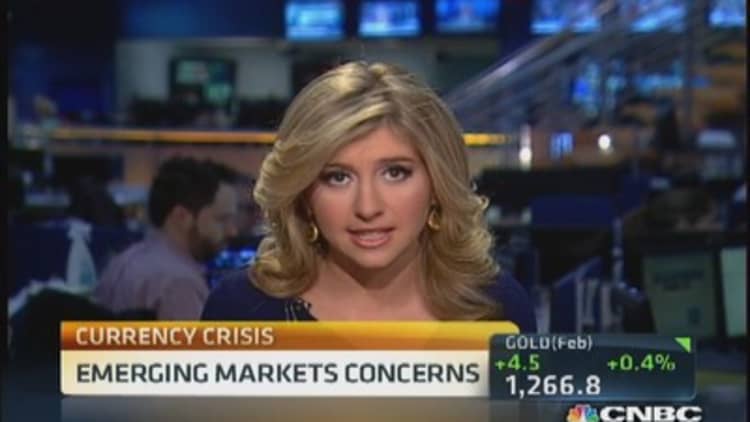I noted yesterday that it's been a very strange year...there are a lot of divergences in the market.
The are down 2.4 percent, but the are up 2.3 percent, and the and the Russell 2000 are also up fractionally. In other words, it's been largely big-cap weakness in 2014 while the rest of the market is holding up fine.
But let's look a little bit farther below the surface.
1) International markets: Europe is a modest winner, Asia and Latin America mostly losers. So far in 2014, developing countries like Europe are winners, though losses overnight have moved a few (France) into negative territory.
Japan, one of the big winners in 2013, is as the yen has strengthened against the dollar in 2014—in line with declines in Korea, China, Malaysia, and Hong Kong.
2) Emerging markets: the strategy of investing in emerging markets has collapsed; investors need new alternatives. Goldman's Jim O'Neill started a revolution a decade ago by inventing the BRIC (Brazil, Russia, India, China) investment idea, but that strategy is in tatters. This year, China is down 2.9 percent, Brazil down 6.2 percent, Russia down 5.5 percent, and India is up fractionally.
Jim O'Neill has long since left Goldman, and has long abandoned talking about BRICs. Instead he is promoting MINTs (Mexico, Indonesia, Nigeria, Turkey) as frontier countries—the new BRICs, in essence.
It's a neat trick, moving away from the China orbit, and it's true some frontier markets are doing fine. African redoubts like Kenya and Nigeria are up, alongside Kuwait and Saudi Arabia. Some ETFs like the Global X Nigeria Index and the iShares MSCI Indonesia ETF have started to attract attention, but the volumes are still thin.
Latin America is generally down as the two big countries—Brazil and Argentina—are having major problems.
Just to show you that positive vibes do not translate into success, Mexico and the has attracted enormous interest in the last year. Mexico has reformed its economy and its proximity to the U.S. makes it an ideal secondary play on the U.S., yet the index was down two percent in 2014 and is down another six percent this year.
The Bottom line: things are very choppy out there.
3) U.S. stocks: a lot of investors woke up on January 2nd and decided they didn't like large parts of the market. There is major sector rotation going on in 2014 that has born witness to:
a) consumer stocks falling out of favor, as investors abandon retail stocks;
b) Energy stocks turning weak (with the exception of a few natural gas names) on the huge output from shale and lower oil prices;
c) Materials getting sold, largely on the weakness in China and low commodity prices;
d) Healthcare being strong, and investors hoping bank stocks will benefit from higher interest rates.
What changed on January 2nd? The world did not shift on its axis, but investors began looking at the markets differently, and stocks have now begun diverging.
Take consumer stocks. They were all up in 2013 as the narrative became about a recovery in housing and autos. Business and leisure travel is increasing, employment is getting better, asset prices are up, so consumer discretionary is the place to be.
Now the narrative has flipped: the weather is lousy, consumers have abandoned the malls, while higher interest rates and higher home prices are going to slow spending on homes.

1) Some fairly optimistic commentary on the global economy this morning. Honeywell CEO Dave Cote: "While we think it's prudent to remain cautious on the global economy at this time, we're increasingly confident in our 2014 outlook based on the momentum from the fourth quarter."
Procter & Gamble CEO A.G. Lafley: "We expect strong earnings growth in the second half of the fiscal year driven by solid top-line growth." Separately, Kansas City Southern CEO David Starling: "We expect to maintain our excellent growth momentum in 2014 and beyond."
However, Starbucks CEO Howard Schultz raised his 2014 earnings per share estimate, though the next quarters are below consensus: "Holiday 2013 was the first in which many traditional brick and mortar retailers experienced in-store foot traffic give way to online shopping in a major way."
2) NYSE IPOs today: a) Online caregiver marketplace Care.com (CRCM) priced 5.3 million shares at $17, above the price range; b) Natural gas exploration and production company Rice Energy (RICE) priced 44 million shares - more than expected - at $21, high end of the price talk.
3) I will be at the Index Universe Inside ETF Conference Monday and Tuesday, along with 1,500 Registered Investment Advisors, reporting on the latest trends in investing and ETFs.
—By CNBC's Bob Pisani


